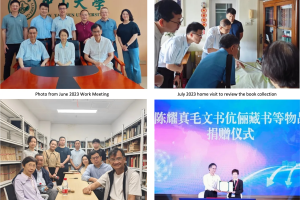
The cataract teaching team of Zhongshan Ophthalmic Center of Sun Yat-sen University has been persistently striving to optimize and reform the surgical skills training system for ophthalmologists. Recently, the cataract department successfully held the "2024 Q2 Phacoemulsification Cataract Surgery Training Course", providing surgical skills training to 40 trainees, including resident doctors, graduate students, doctors for continuing medical education, and the 2023 visiting scholars of ophthalmology from Shanxi Province. For this training, the teaching team innovatively constructed and applied for the first time the PICS (Personalized, Interactive, Contextual, Stepwise) surgical training system, which received unanimous praise from the trainees.
Design and Construction of the New PICS Surgical Training System
In order to enhance the clinical competence of doctors and medical students, the cataract teaching team continuously explores and reforms teaching models, innovatively constructing the new PICS cataract surgery training system. Relying on the teaching platform of Zhongshan Ophthalmic Center, the system integrates three cutting-edge technologies: virtual simulation, haptic feedback, and intelligent interaction, setting up five stages: theoretical teaching, Dry-lab, Wet-lab, step-by-step and complete human eye surgery, to comprehensively enhance cataract surgery skills of ophthalmologists. This training system, considering the diverse types of trainees (resident doctors, graduate students, doctors for continuing medical education, etc.) and their varying levels (from zero to high proficiency in microsurgery), adopts a personalized surgical teaching program classified by levels and categories. It also incorporates interactive simulator training and applies clinical cases for contextual simulation teaching to ensure
In order to enhance the clinical competence of doctors and medical students, the cataract teaching team continuously explores and reforms teaching models, innovatively constructing the new PICS cataract surgery training system. Relying on the teaching platform of Zhongshan Ophthalmic Center, the system integrates three cutting-edge technologies: virtual simulation, haptic feedback, and intelligent interaction, setting up five stages: theoretical teaching, Dry-lab, Wet-lab, step-by-step and complete human eye surgery, to comprehensively enhance cataract surgery skills of ophthalmologists. This training system, considering the diverse types of trainees (resident doctors, graduate students, doctors for continuing medical education, etc.) and their varying levels (from zero to high proficiency in microsurgery), adopts a personalized surgical teaching program classified by levels and categories. It also incorporates interactive simulator training and applies clinical cases for contextual simulation teaching to ensure stepwise mastery of cataract surgery skills.
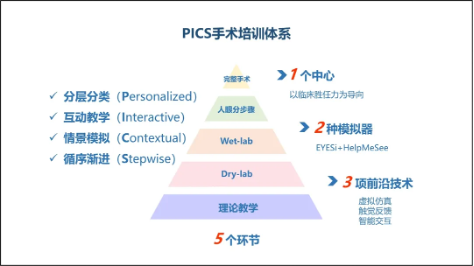
PICS Training System Aids Comprehensive Enhancement of Cataract Surgery Skills
At the opening ceremony of the "2024 Q2 Phacoemulsification Cataract Surgery Training Course", Professor Luo Lixia, the director of the cataract department, emphasized the importance of standardized surgical teaching and hoped that the trainees would learn effectively and apply their knowledge practically. Associate Chief Physician Tan Xuhua, the teaching director of the cataract department, detailed the advantages and characteristics of the PICS surgical skills training system and the design and arrangement of this training course.
During the two-month training course, trainees first received theoretical training, where three teachers including Tan Xuhua, Cao Qianzhong and Chen Hui systematically explained techniques and principles of phacoemulsification cataract surgery, such as incisions, capsulorhexis, nucleus management, and fluid dynamics.
In the Dry-lab training stage, based on the trainees' seniority and proficiency in microsurgery, different simulators and training modules were selected for progressive simulation training. The simulators can instantaneously sense trainee operations, give real-time feedback, and provide intelligent scoring, greatly improving training efficiency through this human-machine interactive learning mode.
In the Wet-lab training stage, trainees performed cataract surgery using real phacoemulsification equipment and surgical instruments on animal eyes. After the practice, their surgical videos were assessed and scored using a structured rating scale through "double-blind review" by two examiners. Outstanding trainees, under the teachers’ guidance, performed step-by-step operations on human eyes and gradually transitioned to complete phacoemulsification surgery. All trainees successfully passed the assessment, achieving comprehensive enhancement of their surgical skills.
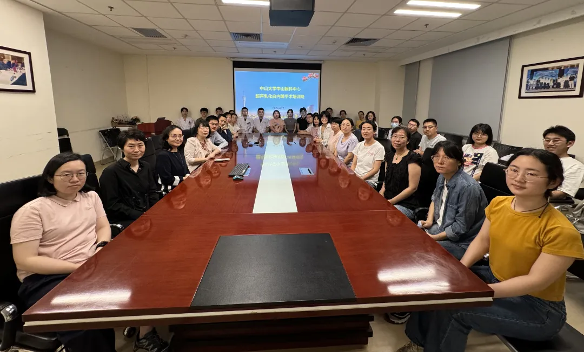
Opening ceremony of the cataract surgery training course
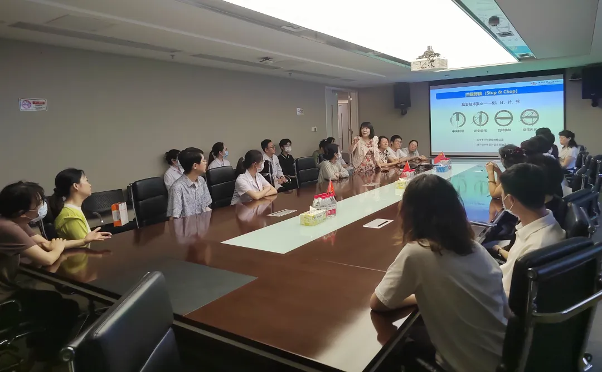
Associate Chief Physician Tan Xuhua introduced course schedule and explained nucleus splitting techniques
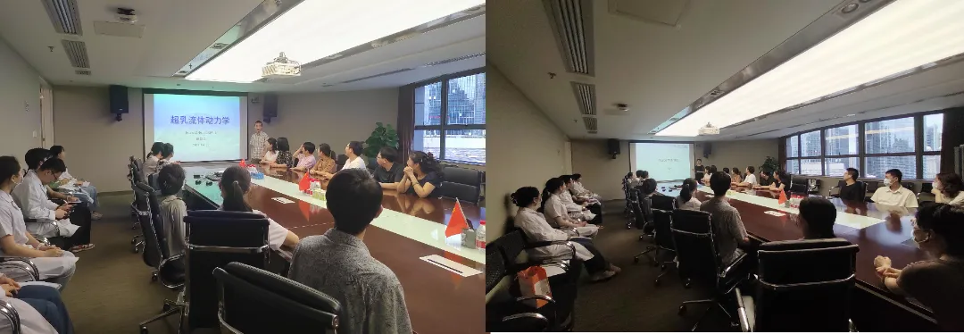
Associate Chief Physicians Cao Qianzhong and Chen Hui explained phacoemulsification theory
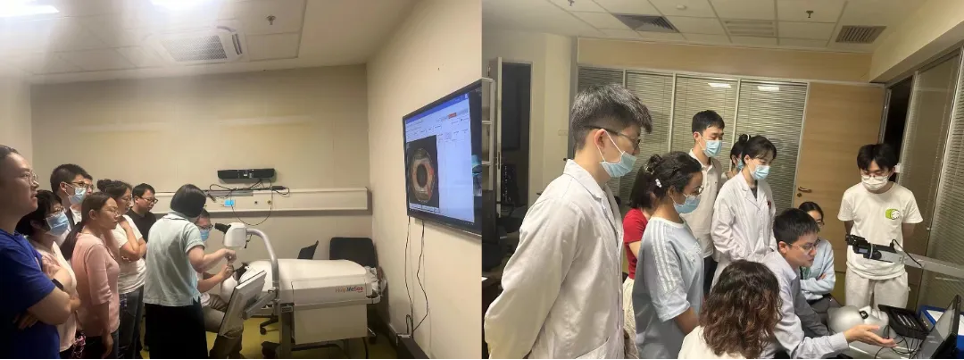
tors Qin Yingyan and Fan Shuxin conducted simulator-based training
The Cataract Department of Zhongshan Ophthalmic Center is committed to the concept of close collaboration between clinical and educational sectors, and leads the way in innovative surgical skills training. By constructing the new PICS cataract surgery training system, the department precisely addresses the needs of different types of trainees, achieving personalized, interactive, contextual, and progressive teaching innovation.
In the context of a new era empowered by technology, and leveraging Zhongshan Ophthalmic Center's advantages in independently developed digital intelligent technologies, the teaching team will further explore the potential applications of new technologies such as artificial intelligence, virtual reality, 3D digital display, and automated surgical platforms in the field of education. By utilizing the advantages of dynamic image capture, intraoperative intelligent navigation monitoring, and real-time 3D imaging, they aim to provide trainees with precise, efficient, and personalized teaching assistance. The Cataract Department will continue to play a leading role as a teaching base, cultivating excellent ophthalmic surgery talents that meet national needs and contributing to the cause of blindness prevention.

Wet-lab training and graduation ceremony
Feedbacks from Trainees
*Visiting ophthalmologists from Shanxi Province *
We were fortunate to participate in this cataract PICS surgical training course. The teachers comprehensively and meticulously explained each aspect and specific steps of phacoemulsification surgery through special lectures and led us in practicing repeatedly on simulators and animal eyes, selecting corresponding simulators and training modules based on our own microsurgery experience for personalized and precise practice. We are grateful to the teaching department of Zhongshan Ophthalmic Center and the cataract teaching team for their hard work and selfless dedication. We will apply the learned techniques to clinical practice as soon as possible to provide more professional medical services to patients.
*Yang Yuanfan, 2021 Graduate Student*
This training course provided me with a systematic study and in-depth understanding of the theory and practice of phacoemulsification cataract surgery. I am grateful to the cataract teaching team for carefully designing the PICS training course. The interactive learning mode in the Dry-lab training stage was very efficient. During the training, I gradually mastered the details and operational techniques of each surgical step. In future studies and work, I will apply the knowledge and experience learned from this training to practice, continuously improving my technical level to bring hope and light to more patients.
*Sun Qihang, 2021 Graduate Student*
I was very fortunate to participate in this PICS phacoemulsification surgery training course and experienced a very fulfilling period of learning. First, the course content was very systematic and detailed, covering all aspects of phacoemulsification cataract surgery. The teachers' explanations ranging from the basic principles of surgery to each operational technique were very clear and easy to understand. The progressive teaching from theoretical training to simulator and animal eye operations greatly enhanced our learning effect. I am grateful to the cataract department of Zhongshan Ophthalmic Center for providing such a valuable learning opportunity, allowing us students who are about to enter clinical practice to better serve patients with the knowledge and skills learned.

